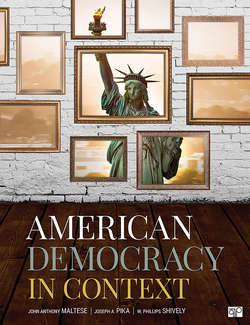Читать книгу American Democracy in Context - Joseph A. Pika - Страница 70
На сайте Литреса книга снята с продажи.
The Delegates and Their Motives
ОглавлениеAll of the states except Rhode Island (which opposed changing the Articles of Confederation) sent delegates to the Constitutional Convention. Of the 74 delegates the states had appointed, only 55 actually attended the convention, and far fewer stayed for the entire convention. The attendees included two of the most famous men in America, George Washington and Benjamin Franklin, and other luminaries such as James Madison and Alexander Hamilton. Notably absent were John Adams and Thomas Jefferson, who were abroad serving as ambassadors to Great Britain and France, respectively. Some passionate advocates of states’ rights, such as Patrick Henry, also stayed away.
In 1913, influential political scientist and historian Charles A. Beard proposed a controversial thesis: In writing the constitution, the framers’ primary goal had been to protect their property holdings and financial self-interest.30 Beard argued that the framers were a group of wealthy elites who had been adversely affected by the type of government created under the Articles of Confederation (see Table 2.1 for an overview of the delegates’ characteristics).31 Beard argued that in establishing property rights and protecting the economic interests of elites, the framers had purposely limited the ability of the majority to exercise real power.
In the 1950s, historians such as Robert E. Brown and Forrest McDonald suggested that a rigorous analysis of the data debunked Beard’s thesis. They pointed out that the framers were not as monolithic in their interests as Beard suggested (for example, some opponents of the Constitution also came from the privileged wealthy class, and not all supporters were wealthy creditors), and that a broader array of interests than Beard recognized had influenced the framers.32
Nonetheless, debate continues. Reality may rest somewhere between Beard’s clear-cut assumptions and the views of critics such as Brown and McDonald. The framers, after all, were politicians influenced by a range of factors. Economics was undoubtedly one of them, but not the only one—or even, necessarily, the most significant one.
Table 2.1
A bare quorum of delegates attended the opening session of the Constitutional Convention on May 25 in what is now called Independence Hall (the room where the members of the Second Continental Congress signed the Declaration of Independence). Thirteen tables—one for each state’s delegation—were arranged in a semicircle. Rhode Island never sent delegates, and New Hampshire’s arrived two months late. No more than 11 state delegations were ever in attendance at any one time. As had been the practice in Congress, each state delegation had one vote. The group deliberated in absolute secrecy so that delegates could express their views without fear of outside retaliation or pressure. Despite the heat, they kept the large windows closed that summer and posted sentries outside to ward off eavesdroppers.33
